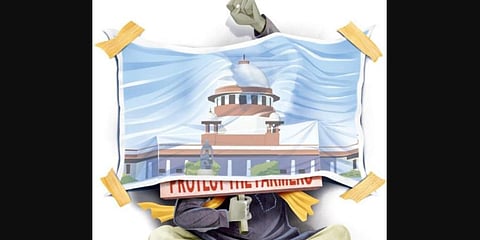

The intervention of the Supreme Court in the ongoing farm laws imbroglio has confounded the chaos. The order staying the implementation of the 3 pieces of legislation and the nomination of an expert committee has, instead of calming the waters, raised the hackles of the agitators. As farmers of the frontline states mobilize for January 26 Tractors March, the battle lines seem more inflexible than ever before. Resuming hearings last Monday on the farm laws, the Chief Justice S A Bobde started on the right foot, pointing out the flawed process of bringing in the laws without proper consultation of the main stakeholders.
“We are extremely disappointed at the way the government is handling all this (farmers protests). We don’t know what consultative process you followed before the laws. Many states are up in rebellion,” the Chief Justice said, adding: “You have made a law without enough consultation resulting in a strike. So now you have to resolve the strike.” Having laid the ground rules for democratic engagement, the Supreme Court bench went right ahead and breached the principles it had earlier so eloquently defined.
The court set up a four-member expert committee, giving the experts two months to come out with a report and solution. No attempt was made to seek the view of the parties before them — the farmers protesting, the government, citizen groups. It was a fait accompli! No wonder the protesting kisan unions saw the Supreme Court move as an attempt to bail out the government. Darshan Pal, President of the Krantikari Kisan Union said: “We knew the government would get a committee formed through the SC to take the burden off its shoulders.”
Packed committee
The fact is three of the four members of the expert committee are supporters of the government position. Ashok Gulati, an agricultural economist, has been a vocal supporter of the farm laws. Writing in a mainline daily, he compared the laws to the 1991 liberalization stating they can “go a long way in building efficient value chains and in ensuring better returns for farmers”. Dr. Pramod K. Joshi, a former director of the International Food Policy Research Institute (IFPRI), has been an opponent of minimum support prices (MSP), which the farmers movement does not want dismantled.
He has also advocated contract farming which is seen as the first step to corporatization of agriculture. The third nominee, Anil Ghanawat, is the president of Maharashtra-based Shetkari Sanghatana, whose founder Sharad Joshi was a votary of ‘open’ markets. The Sanghatna has extended support to the farm laws in writing to Prime Minister Modi. Bhupinder Singh Mann, President of the Bhartiya Kisan Union (BKU), is possibly the only one favorably inclined to the protestors.
However, he has been ousted from his organization, and in the flurry of controversy, has now recused himself from the committee. In a statement, he said he “did not wish to compromise farmers’ interests.” The court has added to the misgivings of the protestors by alluding in its order to “persons who are not farmers have also joined” and who could “create trouble”. In particular there is reference to an “anti- India secessionist movement” called “Sikhs for Justice”. These references will only revive the early bogies of ‘Khalistanis’ and ‘communal forces’ being revived to discredit the farmers movement.
Double standards
India’s judicial conscience has also been stumped by the court’s variable yardstick on judging legislation of doubtful legal quality. Brushing aside objections of the Attorney General, K K Venugopal, that laws enacted by Parliament cannot be stayed by the court, the three-judge bench - the chief justice S A Bobde, A S Bopanna and V Ramasubramanian— held that “this Court cannot be said to be completely powerless to grant stay of any executive action under a statutory enactment.” The same alacrity to correct legislative overreach was, however, missing when the Supreme Court failed to entertain petitions against the Citizenship Amendment Act last year.
This is despite the fact that the support of the anti-CAA protest was probably much wider that the anti-farm laws movement. Again, the repeal of Articles 370 by 35A by Parliament in August 2019 to take away Kashmir’s autonomy was extensively challenged in the Supreme Court. So were the follow-up executive measures including cutting off the internet in the Kashmir Valley, arbitrary arrest and detention of political opponents.
However, most of these cases continue to languish without a listing or hearing by the apex court. In summary, the Supreme Court’s intervention in the anti- farm laws agitation is still born! It has stayed the implementation of the three farm laws; but has not admitted an appeal to examine their constitutional validity. Even the apex court-appointed expert committee’s recommendations cannot become a part of judicial pronouncement. They will have to be given to the government and implemented via amendments to the farm laws. The farmers are acutely aware of these limitations. That is why they are not overly excited about the Supreme Court.
Farmer union seeks removal of members of SC farm laws panel The Bhartiya Kisan Union Lokshakti, one of the 40-odd farmer unions spearheading the agitation, requested the Supreme Court on Saturday to remove the remaining three members of the committee it had set up to resolve the impasse over the three contentious farm laws, and select people who can do the job “on the basis of mutual harmony”.